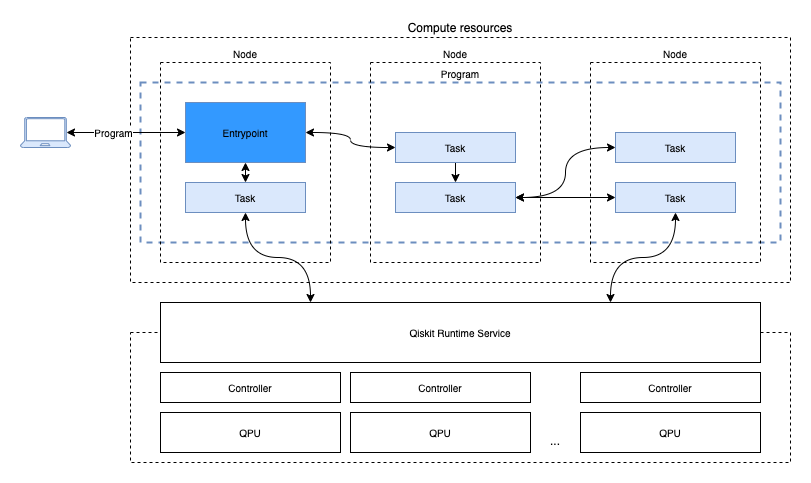
Research
/Security News
Contagious Interview Campaign Escalates With 67 Malicious npm Packages and New Malware Loader
North Korean threat actors deploy 67 malicious npm packages using the newly discovered XORIndex malware loader.
An open-source SDK for resource management in quantum computing workflows.

To install the latest release of the client, run:
pip install qiskit-serverless
To install an editable package from source, run:
pip install -r requirements.txt -r requirements-dev.txt
pip install -e .
Full docs can be found at https://qiskit.github.io/qiskit-serverless/
from qiskit_serverless import distribute_task, get, get_arguments, save_result
from qiskit import QuantumCircuit
from qiskit.circuit.random import random_circuit
from qiskit.primitives import StatevectorSampler as Sampler
from qiskit.quantum_info import SparsePauliOp
# 1. let's annotate out function to convert it
# to distributed async function
# using `distribute_task` decorator
@distribute_task()
def distributed_sample(circuit: QuantumCircuit):
"""Calculates quasi dists as a distributed function."""
return Sampler().run([(circuit)]).result()[0].data.meas.get_counts()
# 2. our program will have one arguments
# `circuits` which will store list of circuits
# we want to sample in parallel.
# Let's use `get_arguments` funciton
# to access all program arguments
arguments = get_arguments()
circuits = arguments.get("circuits", [])
# 3. run our functions in a loop
# and get execution references back
function_references = [
distributed_sample(circuit)
for circuit in circuits
]
# 4. `get` function will collect all
# results from distributed functions
collected_results = get(function_references)
# 5. `save_result` will save results of program execution
# so we can access it later
save_result({
"quasi_dists": collected_results
})
from qiskit_serverless import ServerlessClient, QiskitFunction
from qiskit.circuit.random import random_circuit
client = ServerlessClient(
token="<TOKEN>",
host="<GATEWAY_ADDRESS>",
)
# create function
function = QiskitFunction(
title="Quickstart",
entrypoint="program.py",
working_dir="./src"
)
client.upload(function)
# create inputs to our program
circuits = []
for _ in range(3):
circuit = random_circuit(3, 2)
circuit.measure_all()
circuits.append(circuit)
# run program
my_function = client.get("Quickstart")
job = my_function.run(circuits=circuits)
job.status()
# 'DONE'
# or get logs
job.logs()
job.result()
# {'quasi_dists': [
# {'101': 902, '011': 66, '110': 2, '111': 37, '100': 17},
# {'100': 626, '101': 267, '001': 49, '000': 82},
# {'010': 145, '100': 126, '011': 127, '001': 89, '110': 173, '111': 166, '000': 94, '101': 104}
# ]}
FAQs
An open-source SDK for resource management in quantum computing workflows.
We found that qiskit-serverless demonstrated a healthy version release cadence and project activity because the last version was released less than a year ago. It has 1 open source maintainer collaborating on the project.
Did you know?

Socket for GitHub automatically highlights issues in each pull request and monitors the health of all your open source dependencies. Discover the contents of your packages and block harmful activity before you install or update your dependencies.

Research
/Security News
North Korean threat actors deploy 67 malicious npm packages using the newly discovered XORIndex malware loader.

Security News
Meet Socket at Black Hat & DEF CON 2025 for 1:1s, insider security talks at Allegiant Stadium, and a private dinner with top minds in software supply chain security.

Security News
CAI is a new open source AI framework that automates penetration testing tasks like scanning and exploitation up to 3,600× faster than humans.